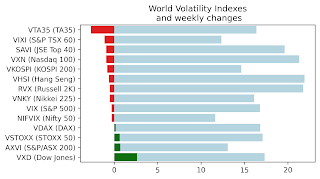Here's the chart of what happened: VSXX originally listed at around the same Euro value as the index, however in the last few weeks VSXX is about 70% of VSTOXX index.

If you looked at the relative plots of VIX and VSTOXX with their futures indexes (on which ETFs are based) it is clear that historically VSTOXX futures index did much better job in tracking index levels than the VIX futures index. To understand the dynamics, I have performed the following two regressions:
return on SPVIXSTR ~ α + β * return on VIX, and
return on VST1MT ~ α + β * return on VSTOXX.
Using the data for the last five years, in the first case α = -0.0016174 (t=-3.2335) α * 252 = -40% per year negative "premium" for the VIX futures index. In the second case α = -0.00021095 (t= -0.30876, intercept not statistically significant) α * 252 = -5% per year negative "premium" for the VSTOXX futures index.
However when I used data for the last half year - approximately since VSXX came into existence, intercept values became much closer to each other, at -0.006422 -0.0047229 for VIX and VSTOXX respectively. These numbers by themselves imply a very negative risk premium, they are at least the same order of magnitude, as opposed to alphas from the 5-year regressions.
It seems that there is an equal demand now in Europe for volatility protection, which brought returns on the futures indexes in line with each other. In fact VSXX and VXX followed very similar paths (normalized returns in local currencies)



